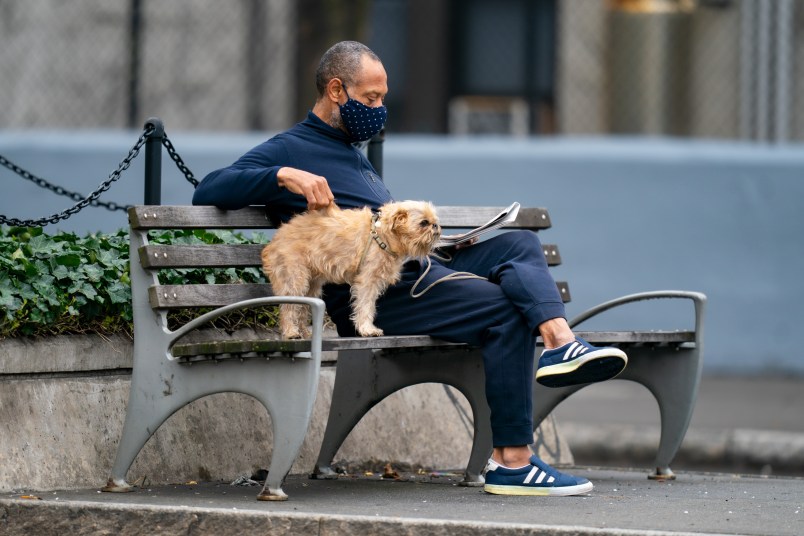This article is part of TPM Cafe, TPM’s home for opinion and news analysis.
Media outlets have played a crucial role during the COVID-19 crisis to educate the public and provide needed emergency information. To ensure the legitimacy of this year’s elections, they should go a step further and offer regular, timely instructions about how to vote during this national emergency. And they should start right away, every day and in every publication, perhaps with a “democracy box” on their front page or home page with details about how to register and cast a ballot.
As the past few weeks have shown, conducting an election in the current climate is incredibly challenging. States are postponing primary elections and, when states have held them, debate has raged over whether voters should even participate in person. Wisconsin’s debacle last week underscores just how difficult holding an election has become. And given that many poll workers are over sixty years old, there is a real danger of persistently understaffed polling locations, which can lead to greater lines and longer voting wait times — making in-person voting even more unsafe.
Fortunately, many states, in an effort to promote both voting and public health, are adjusting their election laws to expand vote-by-mail and otherwise make it easier to participate in our democracy.
When designed properly — following best practices such as allowing voters to cure signature mismatches and also having some in-person voting to ensure no group of voters is disfranchised — vote-by-mail can increase turnout, especially during a public health crisis.
Yet herein lies a problem: election laws are changing so rapidly that it can be difficult to keep up. While it’s good news that election officials are acting quickly to respond to the crisis, so too is it potentially problematic, as voter confusion about these efforts threatens their effectiveness.
But newspapers and other media outlets can bridge the gap. They can educate the public by dedicating ongoing print space to update readers on any legal changes and to explain how to request an absentee ballot in the weeks leading up to a primary or the general election in November. Newspapers could, for instance, include a “democracy box,” or “voting updates” section on the paper’s front page that lists the state’s voter registration deadline, absentee ballot request deadline and a website for more information.
As deadlines to request an absentee ballot approach, state-based newspapers can go even further by turning their entire front page into a step-by-step guide on how to request and submit an absentee ballot, with non-partisan advice on how to ensure one’s ballot will be counted.
And non-print media should play a role, too. Online websites could display a link to www.vote.org — which outlines absentee ballot procedures in each state — on the homepage or as a postscript to their coverage of election changes. Cable news shows could devote segments to vote-by-mail and explainers on why voters should take advantage of it, perhaps with an informational chyron at the bottom of the screen. Given that TV viewership is likely to grow as Americans stay home, this action could increase turnout. Even culture and lifestyle magazines should spread the word about how to cast a ballot safely.
Public education about registering to vote is particularly critical this year. In normal circumstances, many Americans rely on governmental agencies or civic organizations to register to vote. Social distancing largely disrupts this habit.
Even though 39 states and Washington D.C. have online voter registration, which can be used at home, lack of awareness of this option can, once again, hinder its usage. And many states have restrictive voter registration deadlines, ranging from seven to 30 days in advance of an election. Without extensive public education efforts, many voters might find themselves ineligible to vote.
Two years ago, in the Washington Post, we called for newspapers to encourage democratic participation proactively by printing voter registration forms on their front pages. Any reader could cut out the form, fill it out and send it to the Board of Elections. A small-town weekly paper in Ithaca, New York inspired this idea and at least one other paper, the Milwaukee Journal Sentinel, followed suit.
Now, more than ever, newspapers should copy the Ithaca Times and distribute voter registration forms within their publications. They should also provide regular reminders about the voter registration and absentee ballot request deadlines.
Media organizations can play a significant role in aiding the registration of voters and informing them about how to cast a ballot safely. Publishing a “democracy box,” every day, that provides information on both registering to vote and actually casting a ballot would greatly serve the public interest and promote democratic participation in these difficult times. Media outlets should rise to the occasion and mitigate the challenge facing the American public by helping protect democracy.
Joshua A. Douglas is a professor at the University of Kentucky J. David Rosenberg College of Law and author of “Vote for US: How to Take Back Our Elections and Change the Future of Voting.”
Adam Eichen is the Campaigns Manager for Equal Citizens and co-author of Daring Democracy: Igniting Power, Meaning, and Connection for the America We Want.







None of this is Chuck Todd’s job.
Wait, our media?
George Costanza is our media. Always thinking of the proper comeback, on the drive home.
The www.vote.org website looks promising–the kind of thing I might push out but:
If the authors think the media can play a crucial role in preserving democracy they are sadly mistaken. The media is, for the most part, owned by people who are antithetical to democracy. Their only interest in the news is using it to sell detergent and soup. At the ownership level they are all rooting for Trump. They are all Republicans who only think of you and me as consumers.